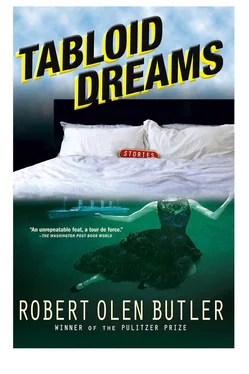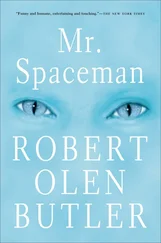When the sound of hammering and the thrashing of air woke me from a deep dreamless sleep, I naturally expected to find myself in the ice field on the morning of April 15, 1912. But overhead was an astonishing thing, a great dark machine, hovering. I thought of the Martians. For a long while. Even after this machine had suddenly swung away and dashed off. Then there was another sharp sound and a ship was approaching and I realized that the air was quite warm and this ship had towers and attachments that were strange to me, like no ship I had ever seen. Some of the others in the lifeboat, women, of course — we were the ones saved with only a few male crew members to row — some of the women in the boat began to weep with fear. “Quiet!” I cried out to them. “Keep your dignity.” And I understood that my anger at them was like their tears. I was frightened into a feeling that I wanted to repudiate as not truly my own.
But when the ship eased up to us and we were finally on its deck and safe, the captain of the vessel, dressed in a white uniform, came to us where we were huddled. And it was a woman. “I am Captain O’Brien,” she said and I knew at once that we had somehow passed far into a future time. I imagined my father’s paper proclaiming “Woman Captains Ship” and soon, of course, there were more wonders. “Great Silver Airship Carries People Five Miles Above Earth,” for instance, and “Horses Disappear from Roads, Replaced Universally by Racing Cars” and “Mathematical Genius Transferred to Tiny Machine” and “Window on World in Every Home.” I have been in this hotel room in Washington, D.C., for less than an hour now and I am very weary. But I have looked through that window, and its view will change to a different part of the world with the merest touch on a small planchette in my hand. This brings a heady feeling of power and I found I could rest on no image for more than a few moments, there is too much to see, and as a result I have seen almost nothing, clearly. My head began to spin and I closed the window. I know I speak in something of a metaphor. It’s not a window but one more machine, a thing called television. And perhaps all these machines, all this technology, mean that the men in mustaches and derby hats triumphed at last. Perhaps ships no longer sink. But through this television I’ve seen enough images of women intimately involved with machines to believe that we’ve been enfranchised in the creation of technology, as well. I am happy for that, but the feeling is not unadulterated. I have to face this selfish part of me.
I am no longer needed, for one thing. I have no proof of it, but I am certain in a world like this that women have the right to vote. And I am confident, too, that politicians have become honest and responsive, as a result. And if there is a woman ship captain and if we have been enfranchised, then I can even expect that there have been women presidents of the United States. It is selfish, but this makes me sad. It would have been better to have died in my own time.
But he saved me, this nameless man. With all the wonders I’ve seen and the losses I’ve realized since I woke from my long and mysterious sleep, it is this man who will not let go of my mind. And there are clothes laid out for me on the bed, strange clothes, a skirt and shirtwaist and undergarments that are skimpy and loose and I am not used to my body, what am I to do with my body now that the focus of my mind has been rendered obsolete? But this is not simply a problem of the new age. Indeed, if in my own time I’d been more comfortable in that fleshy self, I would perhaps have a function, or at least a prospect of pleasure, before me now.
I wish I’d stayed on the ship with him. But I didn’t even know his name. Even after I saw through his foolishness. He tried to convince me that what I knew about the ship was attributable to my being a woman traveling alone, but when I challenged him, when I told him that I knew what death was about, he listened to me again. When I was a child — dear God, more than a century ago now — and my father was editor of the Mingo County Courier in West Virginia and going up even then against the coal company excesses, there was a mine collapse near where we lived and I went with my father to the place, and as soon as I entered that town, I could feel the death in the air, on my skin, all over my body. When I remember it now, it feels like what a man might feel like, stealing in on you in the night and touching you against your will, only you’re sleeping and he’s touching you very lightly so that he doesn’t wake you. And there was a smell in the air. Maybe not quite perceptible but you felt it coming in through your nose and into your lungs, filling you up.
It was that way on the Titanic . As soon as I stepped onto the deck, though almost no one knew what I knew and they were going about their lives, I could smell that same smell. To feel those things on my skin and in my lungs when I was a child, and to watch, as I did, the women of that mining town clutching each other, helpless: I don’t think the world was the same for me after that. But I didn’t speak of that to the man on the promenade deck. I just told him about the mine disaster and what I smelled and that I smelled it again. For almost any man, this would not convince him at all. He would use those very intuitions against me. But he listened, and then he said he was sorry. He actually apologized, and I knew he meant it. And he didn’t try to reassure me anymore. That struck me as wonderful.
And yet I left him. There was some other man, I think, come from the bow of the ship with ice in his drink that had fallen on the deck from the iceberg. My man — what a phrase to come to my lips now, though I mean it only to distinguish him from the other man; I knew neither of their names — my man was quietly disapproving of the other man, who was acting like a fool, it’s true, and for a moment, there was a connection between us — my man, yes mine, and me — we heard the foolishness of this outsider together, we were of one mind about this. Then the other was gone, and my stiff Englishman who respected me, clearly, was silently watching the sea, aware of me, I knew. And then something collapsed in me, as sudden and rock-heavy as the coal mine in Mingo County. It was too late for me. For this man, as well. For all of us. All these odd and sweet feelings I was having turned then into bitterness. I couldn’t bear to look at him anymore. I slipped away without a word. As quietly as the great ship going under. For the Titanic was quiet, in its last plunge.
I stand up from this bed in this cold room and I am still wearing my long skirt and my high-necked linen shirtwaist. I wouldn’t let them take these clothes from me, though I know I must yield eventually, but these things on my bed seem little more than a shadowed nakedness. I wandered the ship for a long while and I was among other people but I spoke not another word. To my shame, perhaps. I did not look at the others. I was dead already, it seemed to me. Then I found a place where I could stand and watch the sea, with no one nearby. A high place. Near the wheelhouse, I think, and, unintentionally, on a deck with lifeboats. The orchestra was still playing. As time went on, there were sounds of people rushing, crying out. I braced my mind so as not to hear. I stood looking beyond the bow, far into the slick dark sea, lit bright by the moon, and the air was cold and I began to shiver, but only from the cold, I knew, not from fear. I did not fear death.
My father had died the year before. He was a good man. I sat beside him and the bed was so neat all about him, my mother had tucked him in and folded the covers rightly across his chest, a straight, orderly fold, and there were flowers in a vase beside his bed, and his pajama shirt was starched, and she had done all that she knew to do, so she was weeping hard in another room. I sat beside my father and I touched his hand and his breathing was difficult now, but he turned his face to me.
Читать дальше












